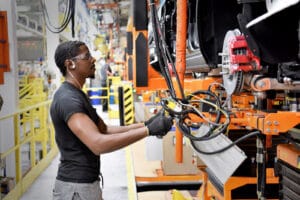
Last week, Ford CEO Jim Farley confirmed what some already predicted: the semiconductor shortage is getting worse, not better and the second quarter will be the low point.
Ford and scores of other automakers have been robbing Peter to pay Paul when it comes to those precious semiconductor chips for months now. However, Ford and its Detroit rival, General Motors, are particularly hard hit, especially when it comes to its highly profitable trucks.
However, one of the protagonists in this ongoing techno-drama offered a ray of sunshine Sunday, then pulled the clouds back over it.
Mark Liu, chairman of Taiwan Semiconductor Manufacturing Co. Ltd., one of the major suppliers of chips in the world, told CBS’ 60 Minutes the company was scrambling to squeeze out all it can from its existing production network.
Not the end, just the beginning
More importantly, it expects to begin producing enough chips to start sending some to automakers by the end of June. However, it will only be the “minimum requirement” needed by automakers. In short: the summer is still going to be bad.

“Today, we think we are two months ahead, that we can catch up the minimum requirement of our customers, before the end of June,” he told the television news magazine. However, he was clear that meant that chips would start to come, not end the shortage.
“There’s a time lag. In car chips particularly, the supply chain is long and complex. The supply takes about seven to eight months,” Liu added.
It’s reportedly about that time that Renesas Electronics Corp. expects to be back up to full production levels at its Japanese plant that was shut down for a month after a fire swept through the facility, forcing it to cease operations.
Renesas is another top supplier of chips to the auto industry. It recently completed its repairs and began limited production April 10. Shipments will begin sometime in the next two weeks. The facility produces chips for Ford, Toyota and others. It will not begin sending full shipments until basically the end of the second quarter.

Waiting to rebound
In the meantime, automakers are simply waiting, hoping to get enough chips to churn out a few more vehicles. Ford is stockpiling nearly done pickup trucks so that it can finish production once its chip supply is replenished.
Last week, several automakers laid out their plans to idle several production facilities due to the shortage. Today, GM extended the shutdown at its Fairfax Assembly plant in Kansas and CAMI plant in Ingersoll, Ontario. Additionally it is slowing production at its Lansing Grand River site.
Ford earlier today revealed plans for production cuts at its assembly plants in Cologne and Saarlouis. German automaker Volkswagen officials supported the assertion made by Farley last week that second quarter production was going to be volatile.
“I think the situation will remain tense,” Ralf Brandstaetter, CEO of the Volkswagen brand and member of the carmaker’s management board, told German news agency dpa. The company’s lost about 100,000 vehicles due to the shortage, Automotive News reported.







